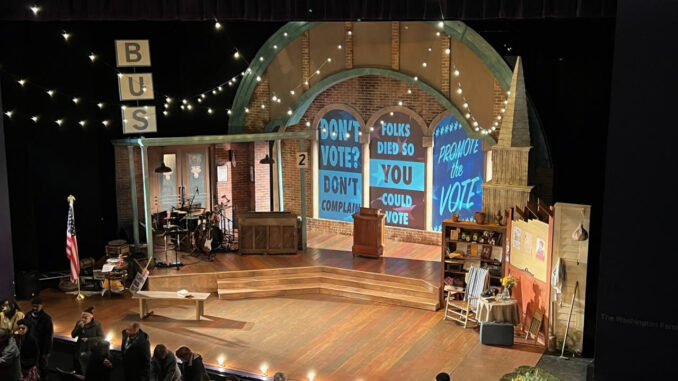
Emily Fritz | A&E Editor
Jan. 19, 2023
Many people enjoy observing Martin Luther King Jr. Day every January because it gives them a day off of work or school, but few take the time to reflect or celebrate the holiday’s namesake for who he was or what he did.
To honor the holiday weekend and the movement that caused it, Pittsburgh’s August Wilson African American Cultural Center put on a special showing of “FANNIE: The Music and Life of Fannie Lou Hamer” in partnership with Kenny Leon’s True Colors Theatre Company, based out of Atlanta, Ga., and Actors Theatre of Louisville in Louisville, Ky.
The one-woman show followed the trials and triumphs of Fannie Lou Hamer, a Civil Rights leader and voting rights activist from Mississippi, who championed for the Student Nonviolent Coordinating Committee, National Women’s Political Caucus and the National Council of Negro Women. Hamer also founded the Freedom Farm Cooperative.
In the show, Fannie (Robin McGee) walked us through her many life experiences. We see her trying to register to vote, hurdling over racist and systemic roadblocks. The audience joined her as she reminisced about her husband, Perry “Pap” Hamer, or mourned the young men of the Freedom Summer murders.
Fannie sang familiar tunes, “This Little Light of Mine” and “Keep Your Eyes on the Prize,” encouraging audience members to sing, stomp or clap along. The show was exceptionally interactive. Unlike other performances, voices from the audience could be heard as people echoed her songs and were encouraged to lend an “Amen” to Fannie’s powerful messages of hope and perseverance.
McGee’s character called upon specific groups in the audience through her anecdotes, breaking the fourth wall even further. As Fannie spoke about the feminist movement and referenced the 19th amendment, she called upon the white women in the audience to draw attention to the importance of intersectionality.
Similarly, she reminisced about the white men who would demand that she “return to Africa.” She explained that she would go back to Africa when the Koreans went back to Korea, when the Irish went back to Ireland, when the Germans went back to Germany and so on until the Indigenous groups were able to claim back their stolen land.
Her direct messaging allowed for present-day connections to shine through at the same time that her words enabled the most space for reflection. Though we’ve come a long way as a country, we still have far to go.
In addition to the better known songs, Fannie sang a short tune titled “I Love Everybody,” which was described as “the easiest song you will ever learn but the hardest you will ever sing.” The lyrics consisted of the title line, sung repeatedly, often in response to bigoted behaviors used against her. In spite of the hatred she faced, she persistently held true to her Christian beliefs, trying her hardest to hold love in her heart for everyone, despite their love or hatred for her.
Authentic to the history of the character, Fannie’s inner dialogue was saturated with love of worship as she repeatedly called upon God to help and change the world around her. While her life was full of hardship, like the passing of her daughter, Fannie did not stop. Although she grieved, she used her heartbreak as a vehicle for her compassion to flow more freely.
Behind Fannie, the windows of the set mirrored her stories, as historical imagery grounded viewers to the weight of the play’s content and anchored them to the lasting impacts felt today. Just as Fannie was followed through her joyful accomplishments, she also described in great detail the racist threats and police brutality that she endured.
The detailed use of background imagery, combined with dynamic lighting, pushed the immersive elements of the show even further. There was no intermission for the 90-minute performance, and consequently no set changes or stage crew. However, the transformative special effects of the show, combined with an on-stage costume change allowed the performance to transcend its setting and give the illusion that Fannie was bringing the audience along throughout a much larger history.
The August Wilson Center has been a staple in Pittsburgh’s Cultural District for more than two decades, celebrating and honoring Black culture under the name and legacy of a Pittsburgh playwright. Black heritage deserves to be celebrated year-round, which is exactly what the August Wilson Center seeks to accomplish.
To learn more about events held at the August Wilson Center, visit https://awaacc.org/.

